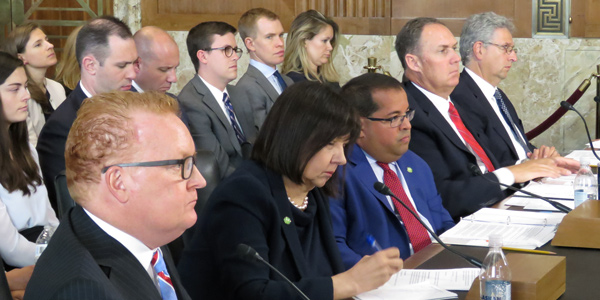By Rich Heidorn Jr.
WASHINGTON — FERC commissioners told Congress yesterday the grid is not facing a national security emergency, as the Trump administration has claimed in its call for saving at-risk coal and nuclear generation.
At an oversight hearing before the Senate Energy and Natural Resources Committee, Sen. Martin Heinrich (D-N.M.) asked the five commissioners whether any of them believed there is a national security emergency in the wholesale power markets.
“I do not, senator,” Commissioner Cheryl LaFleur responded.
“Anyone answer that with a yes?” Heinrich asked. None of the other commissioners spoke.
But coal-state senators also got commissioners to offer soundbites supporting their positions.
When Sen. John Barrasso (R-Wyo.) asked whether the commissioners agreed on the need to keep coal in the generation mix, Chairman Kevin McIntyre responded by reiterating his support for “an all-of-the-above strategy.”
McIntyre also agreed under questioning from Sen. Joe Manchin (D-W.V.) that Energy Secretary Rick Perry has the authority to issue emergency orders under the Federal Power Act and Defense Production Act of 1950. “There’s no question that the secretary does,” McIntyre said.
The two and a half-hour hearing — the first Senate oversight hearing involving all the FERC commissioners in a decade, according to Chair Lisa Murkowski (R-Alaska) — also touched on LNG and pipeline project licensing and the Public Utility Regulatory Policies Act (PURPA).
But President Trump’s June 1 directive that Perry prevent additional coal and nuclear plant retirements dominated the discussions. (See Trump Orders Coal, Nuke Bailout, Citing National Security.)
Most Democrats, led by ranking member Maria Cantwell (D-Wash.), blasted the proposal. LaFleur and Commissioners Richard Glick and Rob Powelson were the most outspoken in their opposition to the subsidies.
Commissioner Neil Chatterjee was somewhat more sympathetic, saying some critics had been too quick to dismiss DOE’s draft memo, which seeks to justify capacity and energy payments to prevent plant retirements.
“There are a number of points in the memo that are thoroughly well cited and researched,” he said. “I think we can have disagreements about what the remedy may be, but I think they raise a real issue … that we need to look at.”
While acknowledging the vast majority of outages are the result of distribution and transmission failures rather than losses of generation, Chatterjee added, “We shouldn’t assume that that good fortune will continue.”
‘Policy Vacuum’
Murkowski acknowledged, “I have my concerns with the steps the Department of Energy is reported to be considering.” But she said DOE was trying to fill a “policy vacuum” created by FERC’s failure to act more quickly on resiliency concerns.
“In my view, FERC should be pointing the way on policy improvements that address grid vulnerabilities, while reaffirming our commitment to competition in wholesale power markets. Frankly, as one who has been concerned about this issue for years now, I find it unfortunate that prior commissions did not lead more effectively,” she said. “We must increase the light and lower the heat in policy debates about price formation, state resource preferences and subsidies.”
LaFleur, the commission’s longest-serving member, defended the commission’s work in navigating the shift to more gas and renewable generation.
“We work to ensure resilience by overseeing market changes to increase compensation to resources that are on line in times of system stress and extreme weather, including baseload resources. In the energy market, we [have] worked on a number of steps since 2014 to improve price formation to make sure the markets send the correct price signals,” she said.
LaFleur said the commission should continue to craft “tailored regional solutions” to address tensions between wholesale markets and state policy favoring certain generators.
“Indeed, I believe the resource turnover we’re experiencing is an expected consequence of markets and technological change, and the lower prices that result from well-functioning markets are a benefit to consumers — not a problem to be solved, unless reliability is compromised,” she said.
“We cannot try to stop the natural evolution of this industry by claims there’s a national security emergency unless there is evidence to suggest an emergency actually exists,” said Glick. “… We need to keep on being vigilant and keep monitoring the situation. But we also need to be wary of people using the situation — or the potential situation — as an excuse to achieve market changes they haven’t been able to achieve otherwise.”
Cantwell said the administration’s “radical” plan could cost consumers billions, telling the commissioners that maintaining “‘just and reasonable’ [rates is] your job … That is why we have a FERC.”
But Sen. Joe Manchin (D-W.V.) dismissed concerns that the subsidies would raise prices. He noted that the draft DOE memo envisioned subsidies for two years while the agency studies grid risks. “You’re acting like it’s going to be forever,” he told the commissioners.
When he pressed the commissioners to identify any generation sources other than coal and nuclear that can provide 24/7 “baseload” power, Glick mentioned “some hydropower,” while Powelson volunteered natural gas.
‘Human Impact’
Sen. Shelley Moore Capito (R-W.V.) complained that renewable subsidies and environmental regulations had “led to a failure that has been punishing” coal generation and the communities that depend on them.
Glick and Chatterjee expressed sympathy for those who have lost their jobs due to coal and nuclear plant closures. But they said providing relief to such workers is the job of Congress and state legislators, not FERC.
Chatterjee said he understood the “human impact” of plant closures because of his visits to West Virginia coal country with Capito and the Colstrip coal plant with Sen. Steve Daines (R-Mont.).
“That is not something that we factor into our record. We will look at plants like Colstrip and make a determination based on … whether there would be threats to reliability in the event the plants shut down,” he told Daines. “But that’s certainly something that’s well within your purview.”













